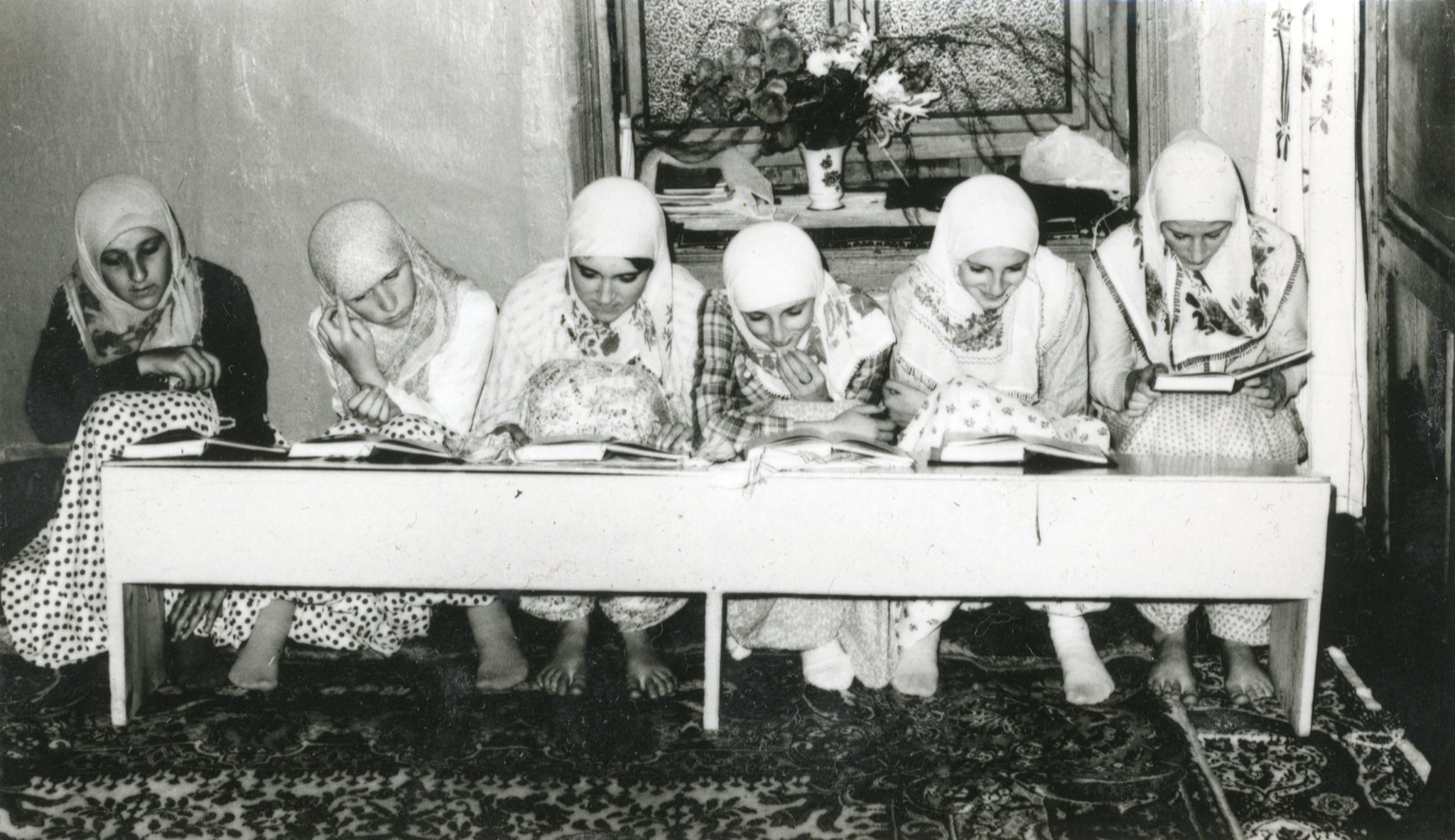
CENTURIES-LONG TRADITION OF RECITING FEMALE HAFIZ MUKABELA IN SARAJEVO
Author: Sumeja Ljevaković-Subašić, PhD, Institute for Islamic Tradition of Bosniaks • Illustration: Mukabela together with adults, 1984, Zvornik • Source: Photo-archive of GHB library in Sarajevo

The custom of reciting mukabela, i.e. reciting the entire Qur'an aloud by several persons, which is typically performed during Ramadan and in the mosque, is one of the mean features of Ramadan in Bosnia and Herzegovina.
It is not known when the custom of reciting mukabela took hold in Bosnia and Herzegovina. The oldest known trace of reciting mukabela in our region dates back to the period of Ottoman rule in Bosnia and Herzegovina. The so-called Gureba-defteri (Notebooks of the Fund for foreigners and threatened which was organized during the month of Ramadan), held in the Gazi Husrev-beg Library, include, among other things, a list of hafizes who recited mukabela during Ramadan in a given year and the amount of remuneration for the reciting. The oldest document of the kind dates back to Ramadan of 1844, and we read there that it was established according to the “customary Gureba-defter, set up for Ramadan...“, which indicates that the fund of the kind had been set up far before and that Bosniaks were familiar with reciting mukabela in this period.
The tradition of reciting mukabela derived from the tradition of the Prophet's a.s. recitation of the Qur'an before Gabriel, a.s., during the month of Ramadan. In its primary form, mukabela implied reciting the whole Qur'an by hafizes during Ramadan, before the morning prayer, noon prayer or Asr prayer, while the recitation was listened to by present believers, who followed their recitation in the mushaf. Such a meaning is also indicated by the very term mukabela, which in Arabic means comparing two things or aligning one thing with another. Thus, mukabela served to compare recitation of the Qur'an by the hafiz with the text of the Qur'an in the mushaf. Therefore, Abdullah Škaljić defines mukabela as reciting the Qur'an aloud by several hafizes, typically during Ramadan.
Although the custom of reciting mukabela in Bosnia and Herzegovina has evolved over the time and assumed new dimensions, the tradition of reciting hafiz mukabelas is still extremely valued and widely practiced by Bosniaks, and fifteen years ago the extremely appreciated and famous hafiz mukabela was launched, which is recited only by female hafizes.
It is known for certain that in Sarajevo and other cities throughout Bosnia and Herzegovina there have been a given number of hafizes at every time. However, the official female hafiz mukabelas have not been recorded in historical sources from the Ottoman period since it is believed that it was difficult to gather a large number of hafizes at one spot to organize mukabela.
The first record of female hafiz mukabela is related to the period of Austro-Hungarian rule in Bosnia and Herzegovina. According to F. Hadžibajrić, this mukabela was recited in the Tabak Hadži Sulejman Mosque in Potok mahala from 1903 to 1907, and it was recited by imam hafiz Jusuf-ef. Grozdanić together with four girls who were hafizes; more accurately, hifz. Vasvija Hadžibajrić, daughter of Hadži Muhamed, Vasvija Goraždak, daughter of Mehmed, and Šemsa Užičanin, daughter of Abdulah, learned hifz before hafiz Grozdanić, while Vasfija Novalija learned hifz before hafiz Šakir-ef. Tuzlo. This mukabela was recited after noon prayer, and was attended only by women. The mukabela was short-lived, because one student (Vasvija Hadžibajrić) of hafiz Jusuf-ef. Grozdanić and her parents found another home in Turkey, while another student (Šemsa Užičanin) got married. Although the mukabela was no longer recited, it is known for certain that Vasfija Novalija and Vasvija Mulabdić (Goraždak) successfully completed the hifz, and the news about their success was reported by journals of the time.
Fifty years after the formation and performance of the first female hafiz mukabela in Sarajevo, during Ramadan of 1953, female hafiz Fatima Zulfikarpašić initiated recitation of female hafiz mukabela in the Hadžijska Mosque in Sarajevo. The mukabela was recited after noon prayer, by female hafizes: hadži hafiza Aiša Pekmez (rođ. Čehić), hadži hafiz Fatima Zulfikarpašić (née Fočo), hafiz Mula Merhemić (daughter of Mujage Merhemića), hafiz Saliha Leto (Zukić) and hafiz Fikreta Tvico (Kalajdžisalihović). According to the report by Fejzullah Hadžibajrić, Sarajevo female hafizes recited this mukabela voluntarily. This unique mukabela was described by many authors who reported on the continuity of maintaining female hafiz mukabela in the Hadžijska Mosque until 1989.
As members of the jamaat of the Hadžijska Mosque in Sarajevo remember, this well-known female hafiz mukabela was interrupted by the beginning of aggression on Bosnia and Herzegovina and was revived in 2008. The jamaat board of the Hadžijska Mosque led by imam hfz. Muriz-ef. Mešić, with the support of the Majlis of the Islamic Community Sarajevo again initiated reciting of the mukabela. Ever since, the mukabela was recited by 30 hafizes from various parts of Bosnia and Herzegovina. In 2022, the 15th anniversary of revitalization of the female hafiz mukabela in the Hadžijska Mosque in Sarajevo, and the 120th anniversary of launching the first official hafiz mukabela in Sarajevo were marked.
Hajji Mosque, Sarajevo (Wikipedia)
Launching, revitalization and nourishing the world-unique custom of reciting female hafiz mukabelas in Bosnia and Herzegovina is a testimony that Bosniak women searched for their place under the auspices of their religion and their community, with the strength of their intellect, persistence and courage.
References:
Sumeja Ljevaković-Subašić, “Ženska hafiska mukabela u Sarajevu: stoljetna tradicijaˮ, Takvim za 2023, Sarajevo, 2022, 133-144.


